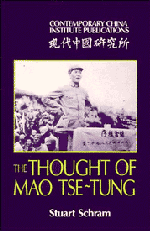Conclusion
Published online by Cambridge University Press: 23 December 2009
Summary
In the Introduction, I argued that the most general, and probably the most lasting expression of Mao Tse-tung's contribution to the Chinese revolution was his thought. This view also implies, conversely, that one cannot sum up Mao's thought without summing up his life as well.
Few would deny Mao Tse-tung the major share of the credit for devising the pattern of struggle based on guerrilla warfare in the countryside that ultimately led to victory in the civil war, and thereby to the overthrow of the Kuomintang, the distribution of land to the peasants, and the restoration of China's independence and sovereignty. These achievements must be given a weight commensurate with the degree of injustice prevailing in Chinese society before the revolution, and with the humiliation felt by the Chinese people as a result of the dismemberment of their country by the foreign powers. ‘We have stood up,’ said Mao in September 1949. These words will not be forgotten.
Mao's record after 1949 is more ambiguous. The official Chinese view is that his leadership was basically correct until the summer of 1957, but from then on mixed at best, and frequently quite wrong. It cannot be disputed that Mao's two major policy innovations of his later years, which were also the two major innovations in his thought, the Great Leap Forward and the Cultural Revolution, were ill-conceived and led to disastrous consequences.
- Type
- Chapter
- Information
- The Thought of Mao Tse-Tung , pp. 195 - 206Publisher: Cambridge University PressPrint publication year: 1989



